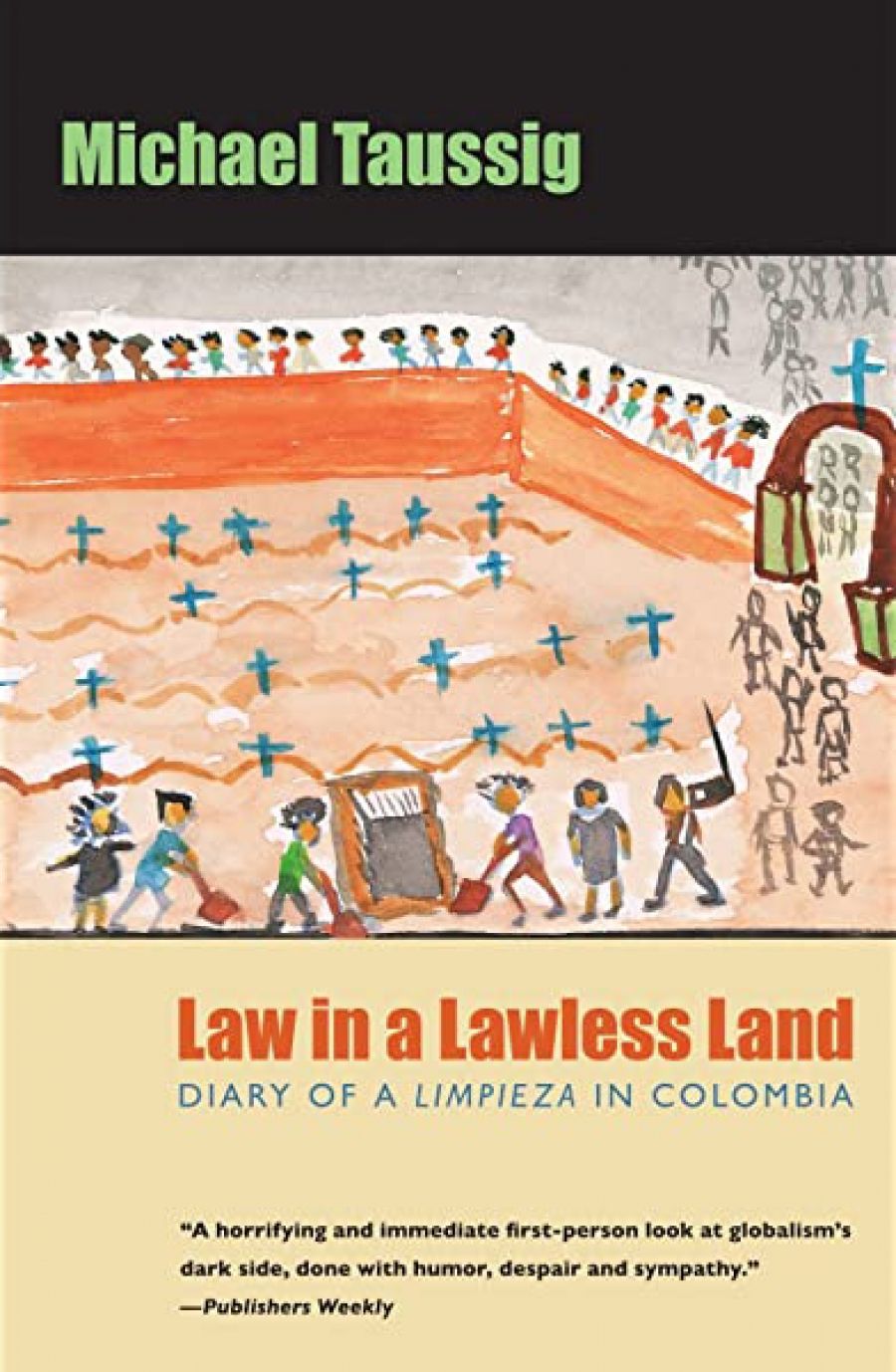
- Free Article: No
- Contents Category: Anthropology
- Review Article: Yes
- Article Title: The Cleansing
- Online Only: No
- Custom Highlight Text:
On the cover of Mick Taussig’s new book, video artist Juan Manuel Echavarria performs a rather clever metaphor for the disintegration of the state. A floral pottery platter with the legend Republica de Colombia para siempre (‘The Republic of Colombia for ever’) is progressively broken up until it is nothing but a pile of white powder: the state as drug cartel.
- Book 1 Title: Law in a Lawless Land
- Book 1 Subtitle: Diary of a limpieza in Colombia
- Book 1 Biblio: New Press, US$24.95hb, 208pp
I love this new work, which finds its roots in Marx and Walter Benjamin, because it has such strong explanatory force, unlike the fairly simple social science still dominating our institutions, which is basically about descriptions and statistics. Too many researchers are happy to let someone else come along later to do something significant with ‘the data’ collected. How much more powerful to create one’s own significance urgently in this writing, to forge a necessary blend of history and political economics, and, at the same time, to understand the value of cultures.
Cultural value emerges in strange ways. We value security, and take it for granted, until lawlessness threatens it. Columbians, now under relatively lawless conditions, have been engulfed by a ‘culture of terror’, and this is Taussig’s subject matter. This culture is complex, for ‘security’ can be provided by paramilitaries, the delivery of justice is more than uncertain, and even human life seems devalued.
Law in a Lawless Land is the diary of two weeks in a country that Taussig has visited nearly every year for the past thirty. It is the diary of a limpieza - a cleansing - as paramilitaries impose law and order through selective assassinations, hitting a town and consulting a list of potential victims on a laptop: ‘soldiers who are not really soldiers but more like ghosts flitting between the visible and the invisible, between the regular army and the criminal underworld of killers and torturers that all states have no trouble recruiting when their backs are up against the wall.’ (It reminds me of old Sam Woolagoodja in the Kimberley who told me years ago about the armed pastoralists coming through and having to ‘clean-im up country’.) How tempting it is to speculate that this everyday terror, which was the past for some of us, might also be our future. But Taussig does not go into allegorical connections between the so-called ‘war on terror’ and the terror that has infiltrated the everyday in Colombian towns. He writes from what he knows and what he observes:
6.30 p.m., back in town to discover that a twenty-eight-year-old man was killed last night in his store opposite the home of my old friend L. Killed by two malandros (criminals), they say, not by paras! L.’s daughter, age nineteen, is hardly able to talk, she’s so excited. She knows the family well. ‘He told them, “Take what you want, but don’t kill me. Rice, aguardiente … take it all!” But they killed him with a bullet through the liver, in front of his children.’
And no one will go to the police, because in their corruption they will target the complainant. Maybe the paramilitaries will take out these delincuentes in the swirling lawlessness that seems to lack structure or ideology.
Taussig asks if we can trust the laws delivered by the state anymore, since even the idea of justice gets shaky in the face of the deceit and fabrication necessary to its maintenance. Who else keeps advocating ‘small government/free market’, I wonder?
And why the diary form? Because in it can be enacted the fear, frustration and fatigue rarely admitted to fieldwork accounts. There’s even an erotic glance: ‘semi-transparent blouses and shorts so short you blush.’ Language is the theatre of memory, not its instrument, he says. It describes, speculates, reflects on theory, and in the process swells and takes on its own volume, hopefully displacing ‘the malignity of the events it describes’. But this diary does not banish the evil in some purifying redemptive gesture; rather, the spirits are conjured and they crowd the text, lending their incantatory power: the philosophers, anthropologists, historians, the dead friends, politicians, judges and drug addicts. As they flit in and out of the text, they constitute Taussig’s mesmerising voice.


Comments powered by CComment